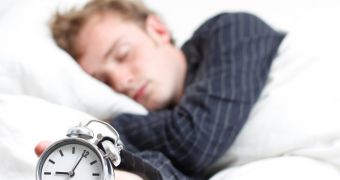A paper published in the scientific journal Sleep this August 1 announces the discovery of a genetic mutation that researchers say explains why some people only need to sleep for about 6 hours per night, maybe even less.
Evidence at hand indicates that this genetic mutation that scientists suspect is to blame for the fact that some people need just a few hours of rest to be able to function normally also helps make folks more resilient to the effects of sleep deprivation.
In their paper documenting the discovery of this mutation, researchers with the American Academy of Sleep Medicine explain that their investigation boiled down to analyzing the sleep patterns and the genomes of 100 pairs of twins.
The twins involved in this study were all in good health. To ensure that the data obtained while studying their sleep patterns and genetic makeup would be as accurate as possible, the researchers only enrolled pairs of twins of the same gender.
During the investigation, it was discovered that some of the twins only needed about 6 hours of sleep per night to be able to function properly the following day. Besides, these twins had an easier time staying alert after going as much as 38 hours without any sleep.
More precisely, they were found to experience 40% fewer lapses of performance when sleep deprived. When compared to their siblings, they also slept 1.5 hours less when allowed to rest and recover from the experience of staying awake for 38 hours in row.
As detailed in a press release concerning this study and its outcome, these twins all displayed a genetic mutation dubbed p.Tyr362His. According to the American Academy of Sleep Medicine researchers behind this investigation, this mutation is a variant of a gene called BHLHE41.
Commenting on these findings, study lead author Renata Pellegrino said, “This work provides an important second gene variant associated with sleep deprivation and for the first time shows the role of BHLHE41 in resistance to sleep deprivation in humans. The mutation was associated with resistance to the neurobehavioral effects of sleep deprivation.”
“This study emphasizes that our need for sleep is a biological requirement, not a personal preference. Most adults appear to need at least seven hours of quality sleep each night for optimal health, productivity and daytime alertness,” added Dr. Timothy Morgenthaler, the current president of the American Academy of Sleep Medicine.
Interestingly enough, a data obtained during a recent survey carried out by the Centers for Disease Control and Prevention in the US indicates that about 28% of the adults living in this country rest for merely 6 hours, sometimes even less, within a 24-hour period. Specialists suspect that most of these people are suffering from sleep deprivation.

 14 DAY TRIAL //
14 DAY TRIAL //